In recent years, the conversation around disability representation in literature has gained momentum, reflecting a growing awareness of the importance of diverse and authentic portrayals of disabled characters. – Raye Al-Jadire (Disability Horizons 3/16/2024)
Living as a disabled person in the United States can present numerous challenges in a society that often prioritizes able-bodied individuals. Addressing these challenges requires societal recognition of the rights and dignity of disabled individuals, as well as proactive efforts to dismantle ableism and create more inclusive environments. This involves not only removing physical barriers but also challenging stereotypes, promoting accessibility, and advocating for the rights of disabled people in all aspects of life.
Disabled literature has the power to challenge these stereotypes, amplify marginalized voices, and foster empathy and understanding, ultimately contributing to a shift in societal perspectives on disability. It provides representation for individuals with disabilities, allowing them to see themselves reflected in literature and media and portraying disabled characters as complex, multifaceted individuals with their own stories, experiences, and perspectives. Through nuanced and authentic portrayals, disabled characters become more than just symbols of inspiration or tragedy; they become fully realized individuals with hopes, dreams, and struggles like anyone else.
Successful depictions of disabled characters foster empathy and understanding among readers by inviting them to see the world through the character’s perspective. They challenge ableist assumptions and encourage readers to confront their own biases and preconceptions about disability. Overall, disabled literature has the potential to not only change individual perspectives on disability but also to contribute to broader social and cultural shifts toward greater inclusion, equity, and acceptance for those with a disability in our communities.
Fiction:
All the Idle Weeds That Grow, by Brian Koukol
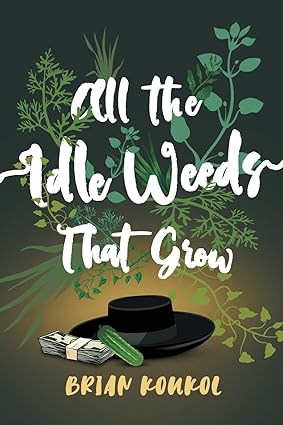 Disabled best friends Zed and Gretchen are barely staying afloat through an adolescent riptide of relationships, ableism, and pickles when their new neighbor and instant crush is mysteriously replaced by an inexact duplicate. Along with a tough as nails non-binary friend from school, they soon find themselves drawn into a thrilling conspiracy of sex, politics, and the Americans with Disabilities Act. Outwitting villains, parents, and curfews, Zed and Gretchen remind the world that disability does not mean inability as they learn about life and love–and how to use others’ prejudices against them. Now they just need to avoid getting killed. By turns hilarious, poignant, and blisteringly honest, All the Idle Weeds That Grow is a coming-of-age novel that embraces the shared humanity of our wide diversities, our conflicts, our beauty, and our mess. The human race may be a vibrant palette that bends toward justice, but it could never achieve such things without the strength of its outliers. Without those pioneering weeds, there could be no garden.
Disabled best friends Zed and Gretchen are barely staying afloat through an adolescent riptide of relationships, ableism, and pickles when their new neighbor and instant crush is mysteriously replaced by an inexact duplicate. Along with a tough as nails non-binary friend from school, they soon find themselves drawn into a thrilling conspiracy of sex, politics, and the Americans with Disabilities Act. Outwitting villains, parents, and curfews, Zed and Gretchen remind the world that disability does not mean inability as they learn about life and love–and how to use others’ prejudices against them. Now they just need to avoid getting killed. By turns hilarious, poignant, and blisteringly honest, All the Idle Weeds That Grow is a coming-of-age novel that embraces the shared humanity of our wide diversities, our conflicts, our beauty, and our mess. The human race may be a vibrant palette that bends toward justice, but it could never achieve such things without the strength of its outliers. Without those pioneering weeds, there could be no garden.
The Invisible Life of Ivan Isaenko, by Scott Stambach
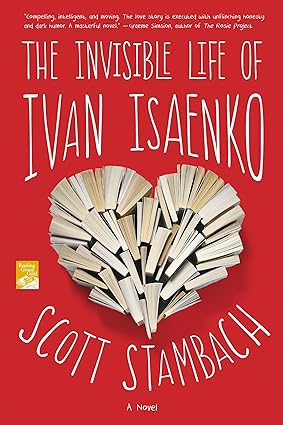 Seventeen-year-old Ivan Isaenko is a life-long resident of the Mazyr Hospital for Gravely Ill Children in Belarus. Born deformed yet mentally keen with a frighteningly sharp wit, strong intellect, and a voracious appetite for books, Ivan is forced to interact with the world through the vivid prism of his mind. For the most part, every day is exactly the same for Ivan, which is why he turns everything into a game, manipulating people and events around him for his own amusement. That is, until a new resident named Polina arrives at the hospital. At first Ivan resents Polina. She steals his books. She challenges his routine. The nurses like her. She is exquisite. But soon he cannot help being drawn to her and the two forge a romance that is tenuous and beautiful and everything they never dared dream of. Before, he survived by being utterly detached from things and people. Now Ivan wants something more: Ivan wants Polina to live.
Seventeen-year-old Ivan Isaenko is a life-long resident of the Mazyr Hospital for Gravely Ill Children in Belarus. Born deformed yet mentally keen with a frighteningly sharp wit, strong intellect, and a voracious appetite for books, Ivan is forced to interact with the world through the vivid prism of his mind. For the most part, every day is exactly the same for Ivan, which is why he turns everything into a game, manipulating people and events around him for his own amusement. That is, until a new resident named Polina arrives at the hospital. At first Ivan resents Polina. She steals his books. She challenges his routine. The nurses like her. She is exquisite. But soon he cannot help being drawn to her and the two forge a romance that is tenuous and beautiful and everything they never dared dream of. Before, he survived by being utterly detached from things and people. Now Ivan wants something more: Ivan wants Polina to live.
The Curious Incident of the Dog in the Night-Time, by Mark Haddon
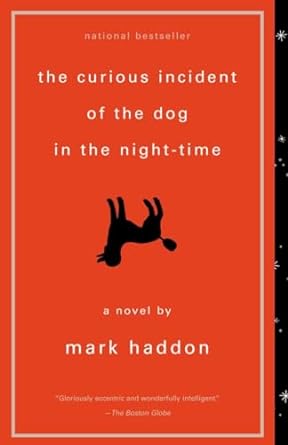 Christopher John Francis Boone knows all the countries of the world and their capitals and every prime number up to 7,057. He relates well to animals but has no understanding of human emotions. He cannot stand to be touched. And he detests the color yellow. This improbable story of Christopher’s quest to investigate the suspicious death of a neighborhood dog makes for one of the most captivating, unusual, and widely heralded novels in recent years.
Christopher John Francis Boone knows all the countries of the world and their capitals and every prime number up to 7,057. He relates well to animals but has no understanding of human emotions. He cannot stand to be touched. And he detests the color yellow. This improbable story of Christopher’s quest to investigate the suspicious death of a neighborhood dog makes for one of the most captivating, unusual, and widely heralded novels in recent years.
Still Alice, by Lisa Genova
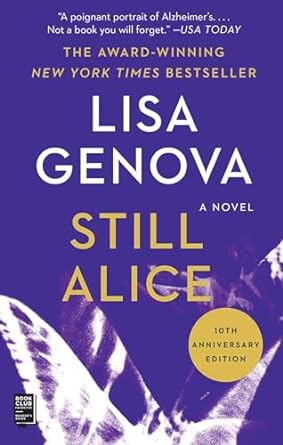 Alice Howland, happily married with three grown children and a house on the Cape, is a celebrated Harvard professor at the height of her career when she notices a forgetfulness creeping into her life. As confusion starts to cloud her thinking and her memory begins to fail her, she receives a devastating diagnosis: early onset Alzheimer’s disease. Fiercely independent, Alice struggles to maintain her lifestyle and live in the moment, even as her sense of self is being stripped away. In turns heartbreaking, inspiring and terrifying, Still Alice captures in remarkable detail what’s it’s like to literally lose your mind…
Alice Howland, happily married with three grown children and a house on the Cape, is a celebrated Harvard professor at the height of her career when she notices a forgetfulness creeping into her life. As confusion starts to cloud her thinking and her memory begins to fail her, she receives a devastating diagnosis: early onset Alzheimer’s disease. Fiercely independent, Alice struggles to maintain her lifestyle and live in the moment, even as her sense of self is being stripped away. In turns heartbreaking, inspiring and terrifying, Still Alice captures in remarkable detail what’s it’s like to literally lose your mind…
El Deafo, by Cece Bell
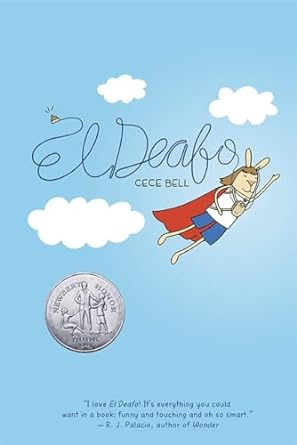 Starting at a new school is scary, especially with a giant hearing aid strapped to your chest! At her old school, everyone in Cece’s class was deaf. Here, she’s different. She’s sure the kids are staring at the Phonic Ear, the powerful aid that will help her hear her teacher. Too bad it also seems certain to repel potential friends. Then Cece makes a startling discovery. With the Phonic Ear, she can hear her teacher not just in the classroom, but anywhere her teacher is in the school—in the hallway . . . in the teacher’s lounge . . . in the bathroom! This is power. Maybe even superpower! Cece is on her way to becoming El Deafo, Listener for All. But the funny thing about being a superhero is that it’s just another way of feeling different . . . and lonely. Can Cece channel her powers into finding the thing she wants most: a true friend?
Starting at a new school is scary, especially with a giant hearing aid strapped to your chest! At her old school, everyone in Cece’s class was deaf. Here, she’s different. She’s sure the kids are staring at the Phonic Ear, the powerful aid that will help her hear her teacher. Too bad it also seems certain to repel potential friends. Then Cece makes a startling discovery. With the Phonic Ear, she can hear her teacher not just in the classroom, but anywhere her teacher is in the school—in the hallway . . . in the teacher’s lounge . . . in the bathroom! This is power. Maybe even superpower! Cece is on her way to becoming El Deafo, Listener for All. But the funny thing about being a superhero is that it’s just another way of feeling different . . . and lonely. Can Cece channel her powers into finding the thing she wants most: a true friend?
The Sign for Home, By Blair Fell
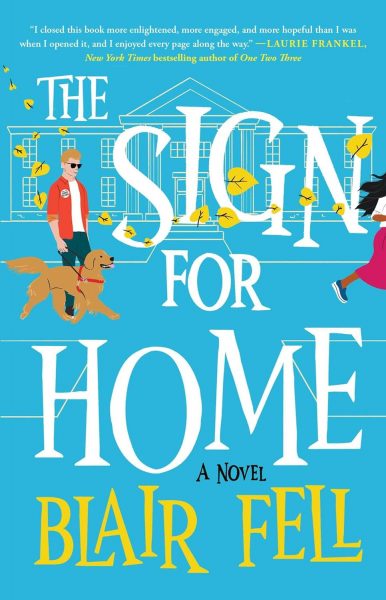 We meet Andrew Leland as he’s suspended in the liminal state of the soon-to-be blind: he’s midway through his life with retinitis pigmentosa, a condition that ushers those who live with it from sightedness to blindness over years, even decades. He grew up with full vision, but starting in his teenage years, his sight began to degrade from the outside in, such that he now sees the world as if through a narrow tube. Soon—but without knowing exactly when—he will likely have no vision left. Full of apprehension but also dogged curiosity, Leland embarks on a sweeping exploration of the state of being that awaits him: not only the physical experience of blindness but also its language, politics, and customs. He negotiates his changing relationships with his wife and son, and with his own sense of self, as he moves from his mainstream, “typical” life to one with a disability. Part memoir, part historical and cultural investigation, The Country of the Blind represents Leland’s determination not to merely survive this transition but to grow from it—to seek out and revel in that which makes blindness enlightening. Thought-provoking and brimming with warmth and humor, The Country of the Blind is a deeply personal and intellectually exhilarating tour of a way of being that most of us have never paused to consider—and from which we have much to learn.
We meet Andrew Leland as he’s suspended in the liminal state of the soon-to-be blind: he’s midway through his life with retinitis pigmentosa, a condition that ushers those who live with it from sightedness to blindness over years, even decades. He grew up with full vision, but starting in his teenage years, his sight began to degrade from the outside in, such that he now sees the world as if through a narrow tube. Soon—but without knowing exactly when—he will likely have no vision left. Full of apprehension but also dogged curiosity, Leland embarks on a sweeping exploration of the state of being that awaits him: not only the physical experience of blindness but also its language, politics, and customs. He negotiates his changing relationships with his wife and son, and with his own sense of self, as he moves from his mainstream, “typical” life to one with a disability. Part memoir, part historical and cultural investigation, The Country of the Blind represents Leland’s determination not to merely survive this transition but to grow from it—to seek out and revel in that which makes blindness enlightening. Thought-provoking and brimming with warmth and humor, The Country of the Blind is a deeply personal and intellectually exhilarating tour of a way of being that most of us have never paused to consider—and from which we have much to learn.
Non Fiction:
Funny, You Don’t Look Autistic: A Comedian’s Guide to Life on the Spectrum, by Michael McCreary
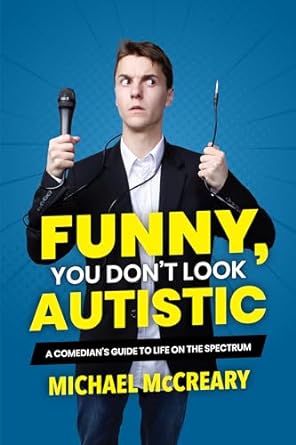 Like many others on the autism spectrum, 20-something stand-up comic Michael McCreary has been told by more than a few well-meaning folks that he doesn’t “look” autistic. But, as he’s quick to point out in this memoir, autism “looks” different for just about everyone with Autism Spectrum Disorder (ASD).
Like many others on the autism spectrum, 20-something stand-up comic Michael McCreary has been told by more than a few well-meaning folks that he doesn’t “look” autistic. But, as he’s quick to point out in this memoir, autism “looks” different for just about everyone with Autism Spectrum Disorder (ASD).
Diagnosed with ASD at age five, McCreary got hit with the performance bug not much later. During a difficult time in junior high, he started journaling, eventually turning his pain e into something empowering—and funny. He scored his first stand-up gig at age 14, and hasn’t looked back.
This unique and hilarious #OwnVoices memoir breaks down what it’s like to live with autism for readers on and off the spectrum. Candid scenes from McCreary’s life are broken up with funny visuals and factual asides. Funny, You Don’t Look Autistic is an invaluable and compelling read for young readers with ASD looking for voices to relate to, as well as for readers hoping to broaden their understanding of ASD.
Disability Visibility: First-Person Stories from the Twenty-First Century, edited by Alice Wong
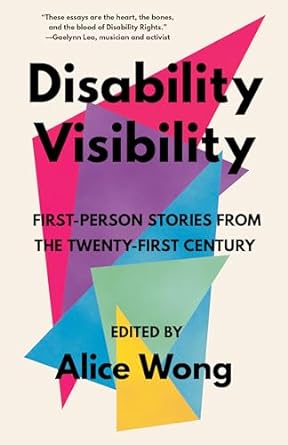 One in five people in the United States lives with a disability. Some disabilities are visible, others less apparent—but all are underrepresented in media and popular culture. Activist Alice Wong brings together this urgent, galvanizing collection of contemporary essays by disabled people, just in time for the thirtieth anniversary of the Americans with Disabilities Act, From Harriet McBryde Johnson’s account of her debate with Peter Singer over her own personhood to original pieces by authors like Keah Brown and Haben Girma; from blog posts, manifestos, and eulogies to Congressional testimonies, and beyond: this anthology gives a glimpse into the rich complexity of the disabled experience, highlighting the passions, talents, and everyday lives of this community. It invites readers to question their own understandings. It celebrates and documents disability culture in the now. It looks to the future and the past with hope and love.
One in five people in the United States lives with a disability. Some disabilities are visible, others less apparent—but all are underrepresented in media and popular culture. Activist Alice Wong brings together this urgent, galvanizing collection of contemporary essays by disabled people, just in time for the thirtieth anniversary of the Americans with Disabilities Act, From Harriet McBryde Johnson’s account of her debate with Peter Singer over her own personhood to original pieces by authors like Keah Brown and Haben Girma; from blog posts, manifestos, and eulogies to Congressional testimonies, and beyond: this anthology gives a glimpse into the rich complexity of the disabled experience, highlighting the passions, talents, and everyday lives of this community. It invites readers to question their own understandings. It celebrates and documents disability culture in the now. It looks to the future and the past with hope and love.
Demystifying Disability: What to Know, What to Say, and How to Be an Ally, by Emily Ladau
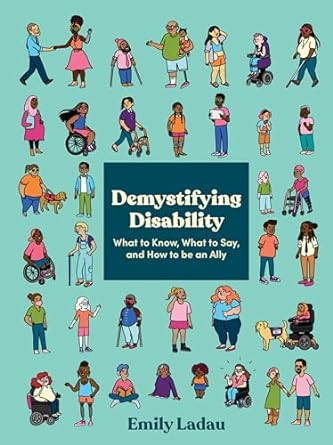 People with disabilities are the world’s largest minority, an estimated 15 percent of the global population. But many of us—disabled and nondisabled alike—don’t know how to act, what to say, or how to be an ally to the disability community. Demystifying Disability is a friendly handbook on the important disability issues you need to know about, including: • How to appropriately think, talk, and ask about disability• Recognizing and avoiding ableism (discrimination toward disabled people)• Practicing good disability etiquette• Ensuring accessibility becomes your standard practice, from everyday communication to planning special events• Appreciating disability history and identity• Identifying and speaking up about disability stereotypes in media Authored by celebrated disability rights advocate, speaker, and writer Emily Ladau, this practical, intersectional guide offers all readers a welcoming place to understand disability as part of the human experience.
People with disabilities are the world’s largest minority, an estimated 15 percent of the global population. But many of us—disabled and nondisabled alike—don’t know how to act, what to say, or how to be an ally to the disability community. Demystifying Disability is a friendly handbook on the important disability issues you need to know about, including: • How to appropriately think, talk, and ask about disability• Recognizing and avoiding ableism (discrimination toward disabled people)• Practicing good disability etiquette• Ensuring accessibility becomes your standard practice, from everyday communication to planning special events• Appreciating disability history and identity• Identifying and speaking up about disability stereotypes in media Authored by celebrated disability rights advocate, speaker, and writer Emily Ladau, this practical, intersectional guide offers all readers a welcoming place to understand disability as part of the human experience.
Visual Thinking: The Hidden Gifts of People Who Think In Pictures, Patterns, and Abstractions, by Temple Grandin
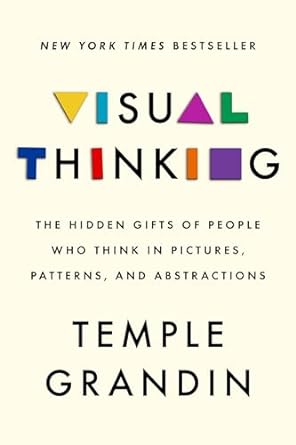 A quarter of a century after her memoir, Thinking in Pictures, forever changed how the world understood autism, Temple Grandin— “an anthropologist on Mars,” as Oliver Sacks dubbed her—transforms our awareness of the different ways our brains are wired. Do you have a keen sense of direction, a love of puzzles, the ability to assemble furniture without crying? You are likely a visual thinker. With her genius for demystifying science, Grandin draws on cutting-edge research to take us inside visual thinking. Visual thinkers constitute a far greater proportion of the population than previously believed, she reveals, and a more varied one, from the photo-realistic “object visualizers” like Grandin herself, with their intuitive knack for design and problem solving, to the abstract, mathematically inclined “visual spatial” thinkers who excel in pattern recognition and systemic thinking. She also makes us understand how a world increasingly geared to the verbal tends to sideline visual thinkers, screening them out at school and passing over them in the workplace. Rather than continuing to waste their singular gifts, driving a collective loss in productivity and innovation, Grandin proposes new approaches to educating, parenting, employing, and collaborating with visual thinkers. In a highly competitive world, this important book helps us see, we need every mind on board.
A quarter of a century after her memoir, Thinking in Pictures, forever changed how the world understood autism, Temple Grandin— “an anthropologist on Mars,” as Oliver Sacks dubbed her—transforms our awareness of the different ways our brains are wired. Do you have a keen sense of direction, a love of puzzles, the ability to assemble furniture without crying? You are likely a visual thinker. With her genius for demystifying science, Grandin draws on cutting-edge research to take us inside visual thinking. Visual thinkers constitute a far greater proportion of the population than previously believed, she reveals, and a more varied one, from the photo-realistic “object visualizers” like Grandin herself, with their intuitive knack for design and problem solving, to the abstract, mathematically inclined “visual spatial” thinkers who excel in pattern recognition and systemic thinking. She also makes us understand how a world increasingly geared to the verbal tends to sideline visual thinkers, screening them out at school and passing over them in the workplace. Rather than continuing to waste their singular gifts, driving a collective loss in productivity and innovation, Grandin proposes new approaches to educating, parenting, employing, and collaborating with visual thinkers. In a highly competitive world, this important book helps us see, we need every mind on board.
Sitting Pretty: The View from My Ordinary Resilient Disabled Body, by Rebekah Taussig
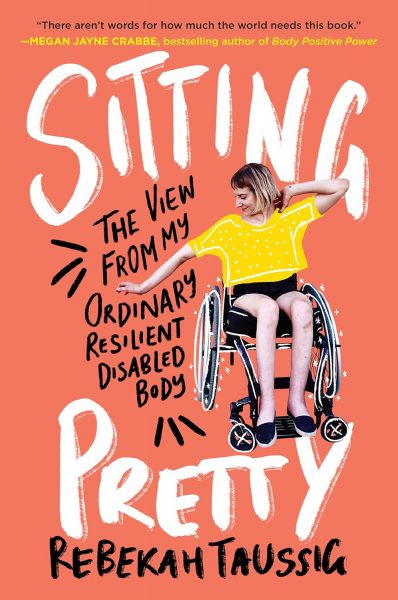 Growing up as a paralyzed girl during the 90s and early 2000s, Rebekah Taussig only saw disability depicted as something monstrous (The Hunchback of Notre Dame), inspirational (Helen Keller), or angelic (Forrest Gump). None of this felt right; and as she got older, she longed for more stories that allowed disability to be complex and ordinary, uncomfortable and fine, painful and fulfilling.
Growing up as a paralyzed girl during the 90s and early 2000s, Rebekah Taussig only saw disability depicted as something monstrous (The Hunchback of Notre Dame), inspirational (Helen Keller), or angelic (Forrest Gump). None of this felt right; and as she got older, she longed for more stories that allowed disability to be complex and ordinary, uncomfortable and fine, painful and fulfilling.
Writing about the rhythms and textures of what it means to live in a body that doesn’t fit, Rebekah reflects on everything from the complications of kindness and charity, living both independently and dependently, experiencing intimacy, and how the pervasiveness of ableism in our everyday media directly translates to everyday life.
Disability affects all of us, directly or indirectly, at one point or another. By exploring this truth in poignant and lyrical essays, Taussig illustrates the need for more stories and more voices to understand the diversity of humanity. Sitting Pretty challenges us as a society to be patient and vigilant, practical and imaginative, kind and relentless, as we set to work to write an entirely different story.
The Pretty One: On Life, Pop Culture, Disability, and Other Reasons to Fall in Love with Me, by Keah Brown
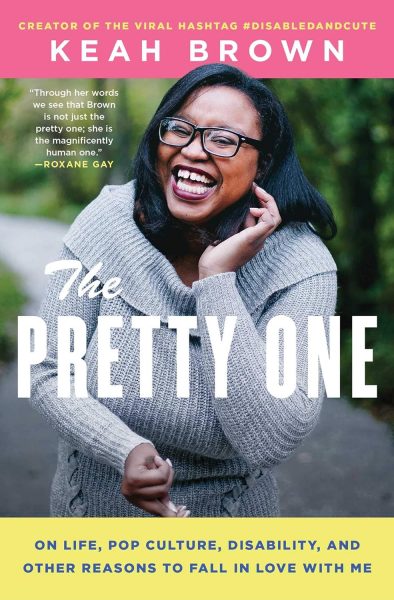 Keah Brown loves herself, but that hadn’t always been the case. Born with cerebral palsy, her greatest desire used to be normalcy and refuge from the steady stream of self-hate society strengthened inside her. But after years of introspection and reaching out to others in her community, she has reclaimed herself and changed her perspective. In The Pretty One, Brown gives a contemporary and relatable voice to the disabled—so often portrayed as mute, weak, or isolated. With clear, fresh, and light-hearted prose, these essays explore everything from her relationship with her able-bodied identical twin (called “the pretty one” by friends) to navigating romance; her deep affinity for all things pop culture—and her disappointment with the media’s distorted view of disability; and her declaration of self-love with the viral hashtag #DisabledAndCute.By “smashing stigmas, empowering her community, and celebrating herself” (Teen Vogue), Brown and The Pretty One aims to expand the conversation about disability and inspire self-love for people of all backgrounds.
Keah Brown loves herself, but that hadn’t always been the case. Born with cerebral palsy, her greatest desire used to be normalcy and refuge from the steady stream of self-hate society strengthened inside her. But after years of introspection and reaching out to others in her community, she has reclaimed herself and changed her perspective. In The Pretty One, Brown gives a contemporary and relatable voice to the disabled—so often portrayed as mute, weak, or isolated. With clear, fresh, and light-hearted prose, these essays explore everything from her relationship with her able-bodied identical twin (called “the pretty one” by friends) to navigating romance; her deep affinity for all things pop culture—and her disappointment with the media’s distorted view of disability; and her declaration of self-love with the viral hashtag #DisabledAndCute.By “smashing stigmas, empowering her community, and celebrating herself” (Teen Vogue), Brown and The Pretty One aims to expand the conversation about disability and inspire self-love for people of all backgrounds.
The Country of the Blind: A Memoir at the End of Sight, by Andrew Leland
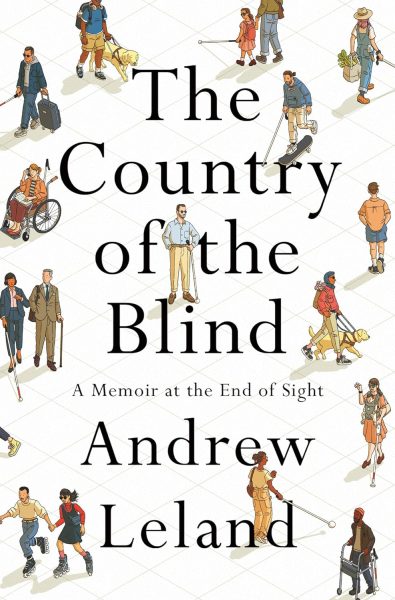 We meet Andrew Leland as he’s suspended in the liminal state of the soon-to-be blind: he’s midway through his life with retinitis pigmentosa, a condition that ushers those who live with it from sightedness to blindness over years, even decades. He grew up with full vision, but starting in his teenage years, his sight began to degrade from the outside in, such that he now sees the world as if through a narrow tube. Soon—but without knowing exactly when—he will likely have no vision left. Full of apprehension but also dogged curiosity, Leland embarks on a sweeping exploration of the state of being that awaits him: not only the physical experience of blindness but also its language, politics, and customs. He negotiates his changing relationships with his wife and son, and with his own sense of self, as he moves from his mainstream, “typical” life to one with a disability. Part memoir, part historical and cultural investigation, The Country of the Blind represents Leland’s determination not to merely survive this transition but to grow from it—to seek out and revel in that which makes blindness enlightening. Thought-provoking and brimming with warmth and humor, The Country of the Blind is a deeply personal and intellectually exhilarating tour of a way of being that most of us have never paused to consider—and from which we have much to learn.
We meet Andrew Leland as he’s suspended in the liminal state of the soon-to-be blind: he’s midway through his life with retinitis pigmentosa, a condition that ushers those who live with it from sightedness to blindness over years, even decades. He grew up with full vision, but starting in his teenage years, his sight began to degrade from the outside in, such that he now sees the world as if through a narrow tube. Soon—but without knowing exactly when—he will likely have no vision left. Full of apprehension but also dogged curiosity, Leland embarks on a sweeping exploration of the state of being that awaits him: not only the physical experience of blindness but also its language, politics, and customs. He negotiates his changing relationships with his wife and son, and with his own sense of self, as he moves from his mainstream, “typical” life to one with a disability. Part memoir, part historical and cultural investigation, The Country of the Blind represents Leland’s determination not to merely survive this transition but to grow from it—to seek out and revel in that which makes blindness enlightening. Thought-provoking and brimming with warmth and humor, The Country of the Blind is a deeply personal and intellectually exhilarating tour of a way of being that most of us have never paused to consider—and from which we have much to learn.
Here are twenty-five more titles in the collection that represent perspectives of/from individuals with disabilities, in no particular order (links go to the catalog):
- Of Human Bondage, by W. Somerset Maugham
- Echoes in the Stars, by Gordon Frisbie
- Good Kings Bad Kings, by Susan Nussbaum
- Gathering Blue, by Lois Lowry
- The Sound and the Fury, by William Faulkner
- I Funny: A Middle School Story, by James Patterson
- Me Before You, by Jojo Moyes
- The Story of Edgar Sawtelle, by David Wroblewski
- You Changed My Life, by Abdel Sellou
- when i grow up i want TO BE A CHAIR: a memoir, by Ryan Rae Harbuck
- All the Light We Cannot See, by Anthony Doerr
- Of Mice and Men, by John Steinbeck
- Fig, by Sarah Elizabeth Schantz
- A Really Good Day: How Microdosing Made a Mega Difference in My Mood, My Marriage, and My Life, by Ayelet Waldman
- The Bell Jar, by Sylvia Plath
- The Last Days of Ptolemy Grey, by Walter Mosley
- The Lady in the Van: and Other Stories, by Alan Bennett
- The Girl Next Door, by Jack Ketchum
- One Flew Over the Cuckoo’s Nest, by Ken Kesey
- The Green Mile, by Stephen King
- Fight Club, by Chuck Palahnuik
- Moby Dick, by Herman Melville
- Wonder, by R. J. Palacio
- Auggie and Me: Three Wonder Stories, by R. J. Palacio
- Ginny Moon, by Benjamin Ludwig
Book club sets are circulated to participating libraries via the CLiC courier. If you are interested in receiving book club sets but are not already a member library, use the online form to get signed up. Since the BCR has always relied on book donations, we are deeply grateful to all of the institutions and individuals that have donated sets and helped make the collection stronger. Please contact bookclub@coloradovirtuallibrary.org for questions or to discuss donations. We also welcome all suggestions of titles to include in the collection.
*NOTE: All descriptions are adapted from goodreads.com and Amazon.com.
- Book Club Author Suggestion: Kristin Hannah - May 21, 2025
- Accessibility Quick Tip: Invitation from OIT - March 19, 2025
- Book Club Author Suggestion: John Green - February 12, 2025